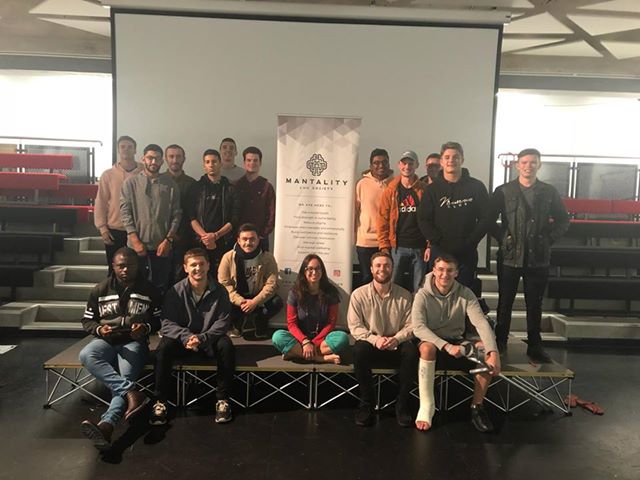This week, Imogen Bicknell, treasurer of LUU’s
They just get on with it don’t they? Men don’t talk about ‘feelings’. Men don’t cry. When they have problems they just…? What? Have a beer or a fight and then it’s over?
Why is men’s pain so trivialised? Made so silent and diminutive? It’s a problem that spans a lifetime.
Other than the socially acceptable emotions of anger and aggression, we tell young boys that crying is for girls and distress is for sissies. A spokesperson from ChildLine revealed they receive calls from boys as young as nine who are frequently told to ‘man up’ when they are upset. Boys in primary school are told to shut their mouths, hold it in and pretend there is nothing wrong.
Men are just as prone to feeling hurt, angry, upset or depressed, only men are notoriously worse at dealing with these feelings. Seeking help isn’t an option; boys don’t cry remember. Men are more likely to use ‘self-help’ measures such as drugs or alcohol. They are more likely to seek avoidance behaviours such as pornography or gambling. They are less likely to open up than women. And this is all reinforced by the society we live in.
It is well known that suicide is the biggest killer amongst men under 45. According to Campaign Against Living Miserably (CALM), every two hours a man takes his own life. Often, few people are aware these men are struggling. For someone so young, seemingly confident, with a bright future in front of them, it seems to come out of nowhere. But years of trying to suppress feelings of helplessness, isolation and loneliness can rise in an unshakable conviction that the world would be a better place without them. After endless darkness and confusion, suicide offers clarity because we give these men no other answer.
Who are these men suffering in silence, too depressed to leave the house, who feel like a fraud when they are socialising with friends, numbing themselves with alcohol and narcotics, contemplating suicide because they genuinely feel they have no other way out of this hole? They are your friends, your brothers, the guy serving your morning coffee, the person sitting silently in a lecture theatre, the rugby playing hero on a night out with his mates. You’ve probably just walked right past him. They are everywhere.
They are people like Stevie Ward, rugby player for Leeds Rhinos. Ward battled with depression, going public with his experiences following the realisation that he was not alone in suffering with mental illness. Ward discovered that many men do want to be honest about their experiences but feel unable to express or articulate them. Stigma steals the words from them. Ward since founded Mantality, an online lifestyle magazine and mental health movement, openly discussing issues faced by young minds.
I myself have made the mistake of thinking men are not as mentally troubled as women. I assumed their silence and stoicism meant that they didn’t feel emotional pain. I’ve been swept up with the stigma that real men don’t cry, finding such a display of vulnerability uncomfortable. I used to believe when men had a problem there would be a blank box in their mind where problems didn’t get to them. I used to envy men, wishing I had a blank box. There is no blank box, pain does not discriminate against gender.
Mental illness is a silent killer. It takes joy. It robs confidence and sense of self. It takes lives. We need a world that says to people of all genders – “I will not judge you if you talk.”
Here at the University of Leeds, we’ve taken Mantality to campus. We are a free society that gives men a safe space to talk. We hold men’s circles every fortnight to discuss REAL issues that are affecting our students. This is followed by a meditation session to give men tools to deal with stress, increase motivation and empower them mentally. We also have links with LUU Yoga and offer regular exclusively male yoga classes. We have events, guest speakers and a Mantality retreat in the pipeline. At Mantality we build resilience, give a support network and let men know it’s okay to not be okay.
To all the men on campus: here is a new option. You don’t have to self-medicate. You don’t have to shut up. Here is an alternative to internalising pain. Building mental health is never easy, it takes persistence and the best time to do it is now. Do not wait until you’ve reached crisis point. Mental health is a muscle that needs to be regularly flexed for maximum performance and protection from illness. It’s disheartening when the GP loses your referral, your parents refuse to accept you have a problem or your friends don’t take you seriously – but at Mantality we 100 per cent will. There is no shame in mental illness, you are no less of a person for suffering. Facing your problems head on is inspiring and brave, and we could do with more men like you!
LUU Mantality meets fortnightly on Tuesdays in Baines Wing room 2.15 between 6pm and 8pm. Find us on social media for more info @luumantalitysociety or email us at luumantalitysociety@gmail.com.
Check out www.mantalitymagazine.com for exciting articles, mental stimulation and mental health inspiration.
Imogen Bicknell
Treasurer of LUU Mantality

